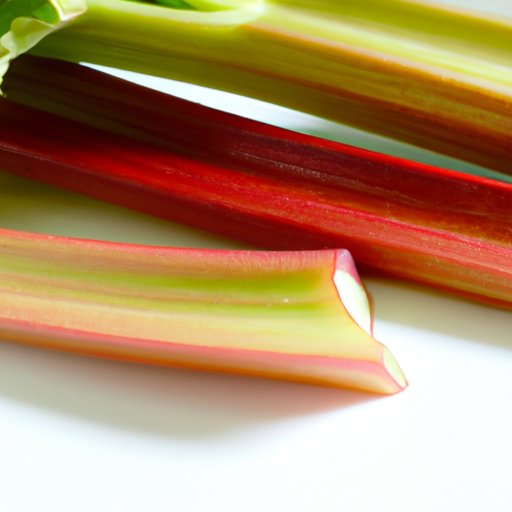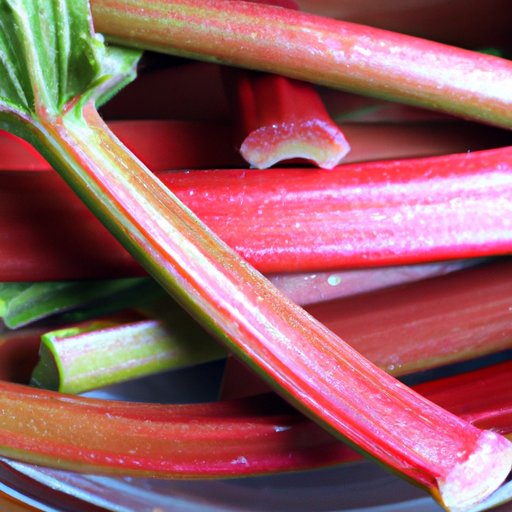
Introduction
Rhubarb is a vegetable with fibrous stalks that are often used in pies and other desserts. However, some people might wonder whether it’s safe to eat rhubarb raw, straight from the stalk. In this article, we will discuss the pros and cons of eating raw rhubarb, how to consume it safely, its nutritional benefits, and some delicious raw rhubarb recipes to try at home.
The Pros and Cons of Raw Rhubarb: Is It Safe to Eat?
Raw rhubarb can be a good source of vitamins and minerals, such as vitamin C, potassium, and calcium. Additionally, it has low-calorie content and high-fiber content, which makes it a great snack for those who are watching their weight. However, it’s important to note that rhubarb leaves contain high levels of oxalic acid, which can be toxic if consumed in large quantities. Therefore, it’s essential to exercise caution when consuming raw rhubarb.
How to Safely Eat Raw Rhubarb: Tips and Tricks
Before eating raw rhubarb, ensure you clean and rinse it thoroughly under running water to eliminate any debris or dirt. As mentioned earlier, rhubarb leaves are poisonous, so ensure you trim them from the stalks and dispose of them properly. Cut the rhubarb stalks into small pieces or slices to make them more comfortable to eat. You could also sprinkle sugar or honey on them for a sweeter taste.
Raw Rhubarb: The Nutritional Benefits You Are Missing Out On
Raw rhubarb is rich in antioxidants, which can protect your body against inflammation and oxidative stress. It’s also an excellent source of fiber, which promotes good digestion and regular bowel movements. Additionally, vitamin K is abundant in rhubarb, which aids in bone health and blood clotting. Please note that cooking rhubarb for long periods reduces the levels of vitamin C and antioxidants. Therefore, consuming raw rhubarb is a great way to obtain maximum nutritional benefits.
5 Delicious Raw Rhubarb Recipes You Need to Try
Raw rhubarb recipes are an excellent way to incorporate this nutritious vegetable into your diet. From salads to smoothies, here are five easy-to-prepare recipes.
- Rhubarb Salad: Chop up some raw rhubarb and toss it with mandarin oranges, sliced almonds, and mixed greens. Drizzle a light vinaigrette dressing to balance the tanginess of the rhubarb.
- Rhubarb Smoothie: Combine chopped rhubarb, strawberries, bananas, vanilla yogurt, and a little honey in a blender and blend until smooth. Adjust the amount of honey to your preferred sweetness level.
- Rhubarb Snack: Slice some raw rhubarb into thin strips and top them with peanut or almond butter. This will give you an excellent combination of crunch and nuttiness.
- Rhubarb Fizz: Cut some raw rhubarb into small pieces and add them to a glass of club soda. Add a slice of lemon or lime and ice cubes for a refreshing summer drink.
- Rhubarb Salsa: Mix some raw rhubarb, chopped onions, minced jalapenos, chopped cilantro, and lime juice. This will give you a tangy salsa that complements grilled fish, poultry, or vegetables.
Why You Should Incorporate Raw Rhubarb into Your Diet
The health benefits of raw rhubarb are numerous, making it a nutritious addition to your diet. Studies show that rhubarb boosts digestion, regulates blood sugar levels, and supports healthy weight management. Additionally, rhubarb contains compounds that are beneficial for cardiovascular health, such as anthocyanins.
From Sweet to Sour: The Flavorful World of Raw Rhubarb
Raw rhubarb has a unique tart taste that adds a tangy twist to any dish. Its flavor pairs well with sweet fruits like strawberries, peaches, and apples. Other seasonings that can complement rhubarb include ginger, cinnamon, and vanilla.

Debunking the Myths: Separating Fact from Fiction About Eating Raw Rhubarb
There are many myths about raw rhubarb’s safety, such as the belief that it’s toxic. While rhubarb leaves contain high levels of oxalic acid, eating raw rhubarb stalks in moderation poses no significant health risks. However, excess consumption of raw rhubarb can upset your stomach and lead to digestive problems.
Conclusion
In conclusion, raw rhubarb is safe and nutritious when consumed in moderation and prepared correctly. It’s a low-calorie snack that is an excellent source of fiber and vitamins. The best way to incorporate raw rhubarb into your diet is by trying different recipes and pairing it with mild-tasting, sweet fruits. Lastly, use caution when consuming raw rhubarb, and consult a healthcare professional if you experience any adverse reactions.





